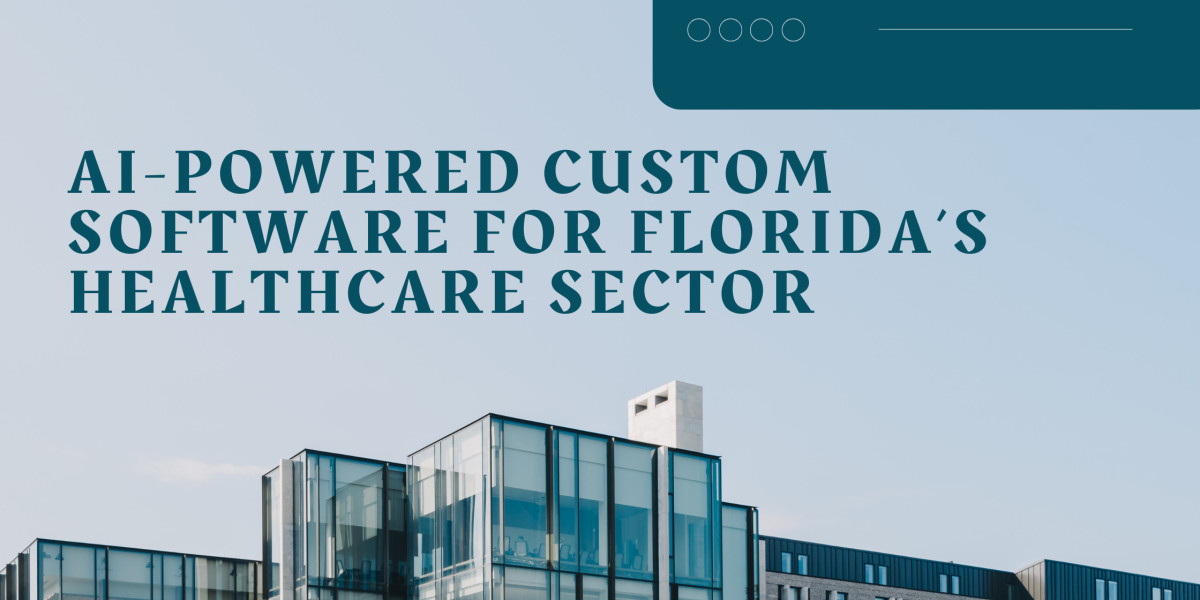A Quiet Revolution Brewing in the Sunshine State
In the bright corridors of Florida's hospitals, a silent revolution is gaining ground—not with fanfare, but with code. As the nation continues grappling with cost-intensive, inefficient healthcare models, something surprisingly transformative is unfolding here. Custom AI-powered software solutions are reshaping how doctors diagnose, how hospitals manage operations, and how patients experience care. And the best part? It’s not just theory. It’s already happening.
So, why Florida? And why now? The answer lies at the intersection of demographic urgency, policy shifts, and tech innovation. Florida's aging population, growing healthcare infrastructure, and openness to tech adoption make it a hotbed for experimentation with intelligent solutions. And where there's complexity, there's fertile ground for software that's not just custom-built—but custom-built smart.
Why Healthcare in Florida Is Ripe for AI Intervention
Florida has one of the highest concentrations of elderly residents in the U.S. By 2030, more than a quarter of the state's population will be over 65. This isn’t just a statistic; it's a defining parameter that dictates how healthcare services need to evolve. Chronic diseases, long-term care, mobility issues—the healthcare demands of an aging population aren’t just higher, they're vastly different.
This demographic shift also places unprecedented pressure on medical professionals and administrative staff. AI-enabled custom software offers a compelling response: predictive diagnostics, real-time patient monitoring, resource allocation algorithms, and administrative automation that can ease the burden while enhancing accuracy.
In a state known for seasonal population spikes and geographic spread, scalability and real-time adaptability aren't optional. They're essential. AI-integrated custom platforms are engineered to adapt on the fly, personalize patient journeys, and flag potential risks well before they manifest.
From Band-Aids to Brainpower: Where Generic Software Fails
Off-the-shelf healthcare software was never built with Florida in mind. Or Miami. Or Tampa. Or a small clinic in Ocala. These platforms are generalized by design, aiming for mass usability across various states and care models. But healthcare in Florida isn't generic—it's uniquely localized, regulated, and patient-specific.
AI-powered custom software fixes what generic tools can't. Let’s take hospital readmissions as an example. National systems can tell you a patient has a 30% risk of readmission. A Florida-specific AI-powered solution can factor in regional weather trends, facility-specific staff rotations, and even the availability of community services in Jacksonville versus Orlando. That’s insight with depth—insight that acts.
Where Custom Software Meets AI: Real Use Cases in Florida Healthcare
It’s easy to talk about potential. Let’s talk reality.
1. Predictive Care Pathways at Regional Hospitals
Some Florida hospitals have deployed AI-backed custom platforms that analyze patient data to predict complications even before symptoms escalate. These systems don’t just flag risks—they map entire care pathways. This has led to measurable reductions in emergency interventions and improved long-term outcomes.
2. AI-Driven Scheduling Systems for Clinics
Forget chaotic appointment books. Clinics in South Florida are using custom scheduling solutions powered by AI to optimize daily patient flow. These tools learn from traffic patterns, seasonal flu trends, and even the speed of individual practitioners to reduce wait times and improve staff efficiency.
3. Automated Claims Management
Billing errors in healthcare cost billions annually. Florida-based providers are using intelligent software to automate claims filing, flag anomalies in real-time, and ensure compliance with both federal and state-specific regulations. The result? Faster payments, fewer denials, and happier administrators.
4. Chronic Disease Management at Home
With Florida’s elderly choosing to age in place, home-based care is rising. Custom apps, linked to wearable tech, use AI to track health vitals continuously. Anomalies trigger alerts to both family caregivers and medical teams. It's remote care with accountability and precision.
The Data Dilemma: Compliance, Privacy, and Trust
No discussion about AI in healthcare is complete without addressing the elephant in the room: data. Florida, like every U.S. state, is governed by HIPAA. But that's just the baseline. With new layers of AI come new layers of complexity. Data provenance, algorithmic bias, consent management—these aren’t technical side notes. They're central pillars.
Custom software developers in Florida are increasingly building solutions with baked-in compliance frameworks. That means audit logs, access controls, encrypted storage, and user-consent workflows aren’t tacked on as afterthoughts—they're part of the DNA.
And let’s not underestimate public sentiment. For AI in healthcare to scale, trust is non-negotiable. The best custom developers aren’t just coding for performance; they’re coding for confidence. That’s the difference between adoption and abandonment.
The Economics: Yes, It Actually Saves Money
We often associate custom-built anything with high costs. And in the short term, that can be true. But AI-powered custom software isn’t about buying bells and whistles—it’s about solving specific, high-impact problems. When a hospital slashes readmission rates by 20% or when claim processing time drops from weeks to days, the financial math starts to favor customization.
Moreover, as AI becomes more modular and platforms more open-source, development costs are coming down. Florida-based software teams are now able to build agile, interoperable systems faster than ever. The ROI doesn’t just justify itself—it compounds.
The Shift from Patient Records to Patient Intelligence
One of the most intriguing developments in Florida's healthcare tech landscape is the shift in how we think about data. It’s no longer just about recording symptoms and treatments. It’s about generating actionable insights from real-world evidence.
AI-enabled platforms are now layering behavioral data, genetic information, and even socioeconomic indicators to personalize care. Imagine a system that doesn’t just know your medication history, but understands your likelihood of adhering to a treatment plan based on your work schedule and family structure.
This is where custom software shines. Templates don’t cut it here. You need deeply embedded logic that evolves as your user base does. Florida's healthcare institutions are quickly realizing that intelligence isn’t a feature. It’s a foundation.
Training AI on Florida’s Realities
Off-the-shelf AI tools often come pre-trained on datasets that reflect national or international trends. But what if those trends don’t align with Florida's unique context? What if hurricane season affects emergency room visits? What if language access needs vary drastically between Miami and Tallahassee?
Custom AI development means you’re not guessing. You’re training models on local data, tuning algorithms to Florida’s regulatory environment, and calibrating user interfaces for local demographics. This level of localization isn’t optional. It’s mission-critical.
Why Healthcare Leaders Are Finally Paying Attention
For years, innovation in healthcare tech was dominated by academic think tanks and Silicon Valley giants. But Florida's providers are proving that real change doesn't require a San Francisco zip code. It requires intent, insight, and the right partners.
Hospital CIOs, private practitioners, and even state health officials are increasingly seeking custom AI-based solutions tailored to their needs. The shift is palpable. No more waiting for big vendors to roll out national updates. Florida wants software that understands it—and acts accordingly.
A Look Ahead: The Next Wave of AI Integration
AI in Florida healthcare is still young. But it’s maturing fast. The next frontier? Proactive wellness management. We’re talking apps that nudge behavior change, AI therapists that detect early signs of mental health issues, and systems that synthesize input from dozens of data points to recommend life-saving interventions before symptoms occur.
This won’t be driven by massive corporations but by nimble development teams in Florida who understand that personalization isn’t a perk—it’s a prerequisite.
The direction is clear. The technology is ready. And most importantly, the will is there.
Conclusion: Building Smarter, Healthier Futures with AI
Florida’s healthcare sector isn’t waiting for innovation to arrive; it's building it. And the builders are local custom software developers who know the terrain, understand the regulatory nuances, and care about outcomes. In the coming decade, expect AI-powered custom solutions to move from the periphery to the core of healthcare delivery in the state.
For hospitals, clinics, and care providers looking to future-proof their operations while delivering more effective, personalized care, the time to act is now. Investing in AI isn't a gamble. It's a strategy. And the key to that strategy is thoughtful, intelligent, and compliant software tailored to Florida's specific needs.
That's the promise of custom software development Florida needs to embrace—and fast.







